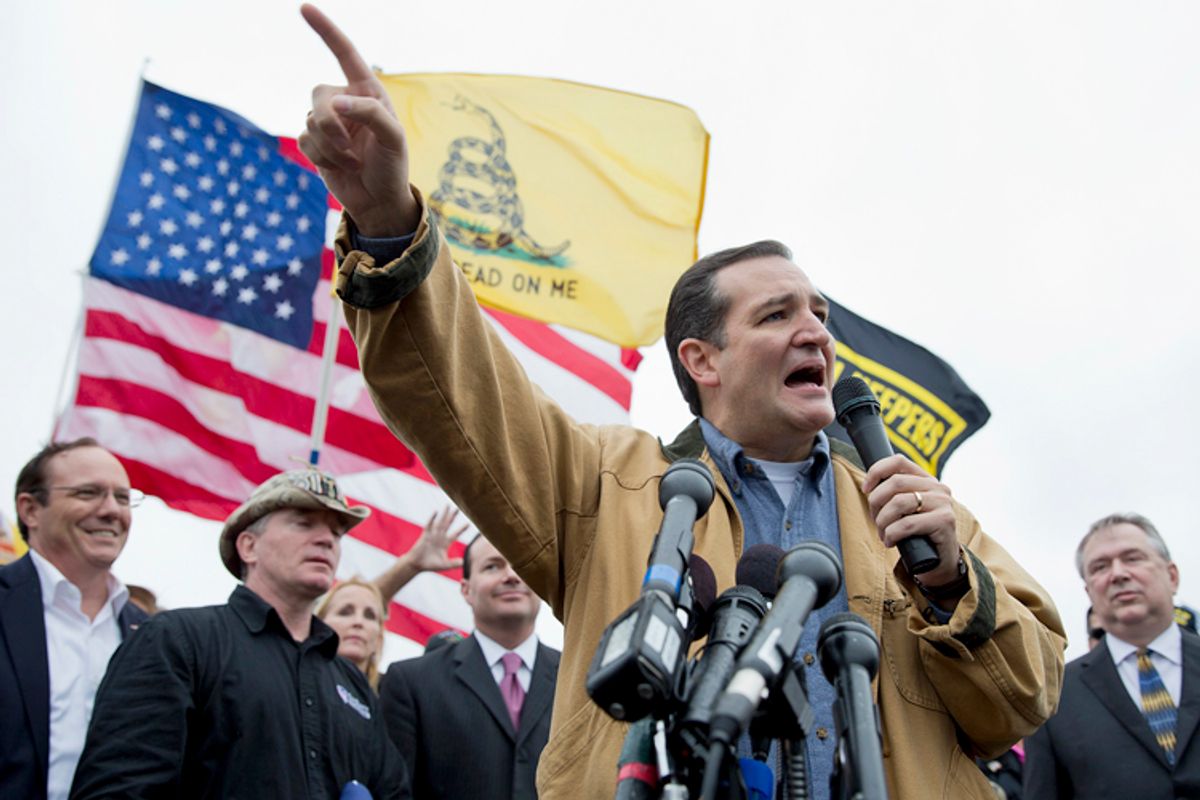Nobody, not even President Obama, is pretending that the rollout of the Affordable Care Act has been anything but a debacle.
Reading headlines in the national press, though, you'd get the impression that repeal is right around the corner. For that to be true, though, several dozen House Democrats and over a score of Democrats in the Senate would have to be willing to vote with Republicans to override a veto. And even under these miserable circumstances, only 39 House Dems, overrepresented by representatives of swing districts, voted with Republicans for the so-called "Upton bill," to allow health insurance carriers to restore canceled policies and sell them to newcomers outside of the Obamacare exchanges. A bad bill, but not full repeal
Dems aren't anywhere close to a tipping point, even if things don't get better soon. Just to be sure, though (and at the risk of being meta), I asked Rep. Steve Cohen, D-Tenn., about this on MSNBC this Saturday. Here's what he had to say.
"There's enough Democrats who … politically are going to support the president, philosophically are going to support the law [that] I can't see a veto proof number coming up," he said. "I just don't see that happening. But you've gotta remember, we just put off the budget, put off the sequester, we didn't cure that problem we put it off. So you've got some real problems coming up in January and in December with budget numbers and the sequester. So there's a lot of problems that can arise. But the bottom line is that Democrats are going to be vulnerable to Republican attacks on the Affordable Care Act regardless. I understand why those 39 voted the way they did. But I think the rest of the caucus is pretty strong and will stick with the president and support him and support the Affordable Care Act."
I think he's right. I think it actually goes beyond that, too. Even if the White House's mismanagement of the rollout shakes 100 Democrats' faith in the whole project, they can't unbrand themselves. Obamacare bears the president's name, but it's a Democratic Party creation full stop. If Democrats help Republicans obliterate it, it will be an enormous admission of governing incompetence. A "don't elect me or members of my party because we don't know what we're doing" vote.
That leaves two possible futures for the Affordable Care Act. One in which it limps ahead. Another in which it undertakes a swift reversal of fortune.
The nightmare scenario isn't that Obamacare will be repealed. It's actually hard to imagine a scenario in which Obama leaves office in 2017 without having overseen a massive expansion of health insurance coverage in the U.S. But getting there could be excruciatingly difficult.
If fixing Healthcare.gov takes significantly longer than the Obama administration is forecasting -- if the bottleneck persists and enrollments never spike -- political, moral and substantive considerations change. What happens, for instance, if fewer people enroll through the exchanges than see their policies canceled?
A net reduction in individual market coverage would be politically humiliating. It would also raise the moral question of whether it's fair to impose penalties on people for not entering a system that they can't access and probably don't trust. At that point, Democrats would face intense pressure to vote for a delay of the individual mandate. They might do it, too. To stave off a full-scale rebellion, the administration would probably act unilaterally, agree to provide hardship exemptions en masse, and hope to hold the votes for a universal delay below a veto-proof threshold, to protect markets in states like Kentucky with functioning exchanges.
Vastly preferable is a "nowhere to go but up" scenario where the website works pretty well in a couple of weeks, enrollments shoot upward, quickly overtaking the number of people whose policies have been canceled. Ideally many of the people who just lost their coverage (motivated insurance purchasers) turn to the exchanges and find policies that they like, or at that they're happy enough with to quiet their anger over the cancellation of their old plans.
In this scenario, aggregates will begin to matter. The media's bias toward anecdote and hardship -- which has dominated the news for the past month and a half -- will have to contend with raw numbers. If total enrollments, including new Medicaid beneficiaries, approach anywhere near the 16 million the Congressional Budget Office initially projected, the tale of the ACA's success will be impossible for the media to ignore.
Starting Dec. 1, opponents of the law will screen-grab and disseminate every website failure they happen upon. But if the law truly is working well "for the vast majority of users" as the administration likes to say, it will be reflected in swelling enrollment figures and regular updates on the law's improving progress. That'll take the sting out of "you can keep it" attacks. Democrats won't have anything to run from anymore. You can even imagine them repurposing the Upton bill, to put Republicans on the record against stripping new beneficiaries of their health plans.
I imagine a volte-face like that would stop the repeal campaign dead in its tracks.



Shares